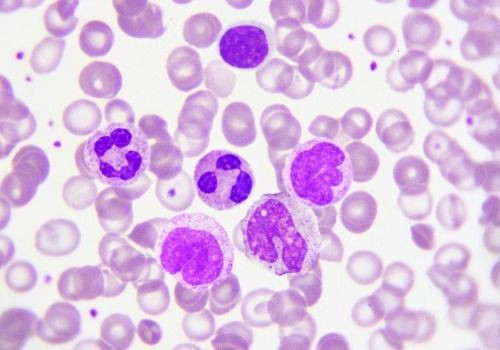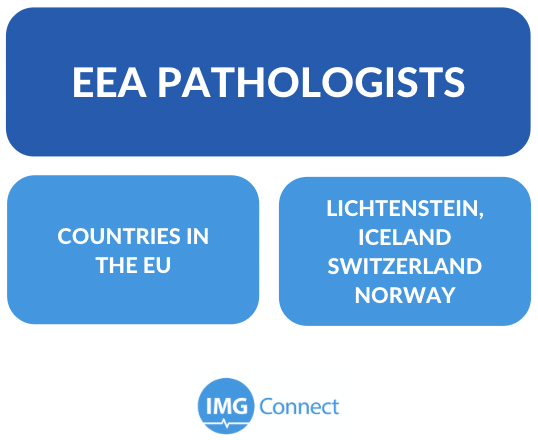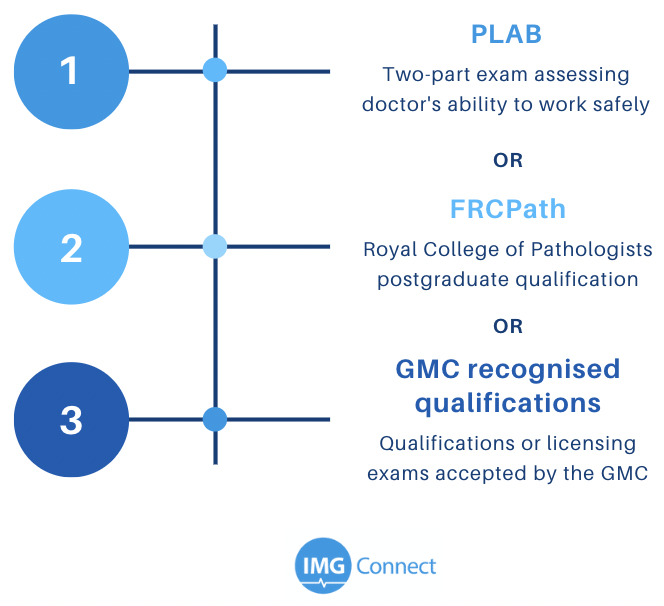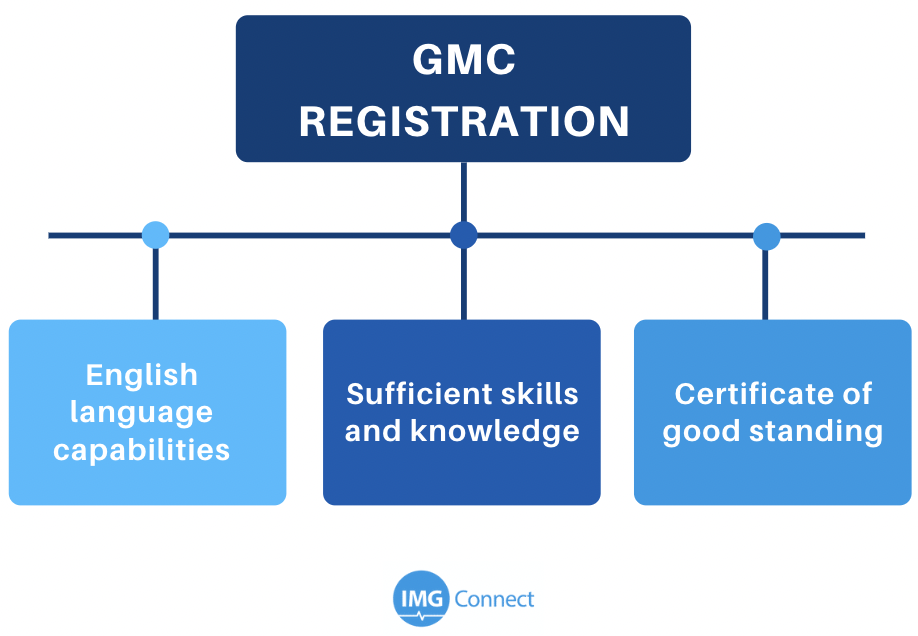A Haematologist’s Route to the UK
- April 19, 2022

There are several routes a haematologist can take to register with the GMC and practice in the NHS.
Haematologists looking to secure a job in the NHS must satisfy certain criteria before fully registering with the GMC (General Medical Council) to receive a license to practice. For haematology, these criteria depend on where you received your training, and the qualifications you hold. In this blog, we’ll be giving you a snapshot of the steps you need to take to begin your journey to the UK as an overseas haematologist.
We’ll be covering the following:
- Will my training be recognised in the UK?
- How do I demonstrate my knowledge and skills as an EEA haematologist?
- How do I demonstrate my knowledge and skills as a non-EEA haematologist?
- How can I demonstrate my English language skills?
- What is a certificate of good standing and how do I get one?
- What do I need to register with the GMC?
- Will I need a visa to work in the UK?
Skip ahead to the relevant section if you know what you’re looking for.
Recognition of training
For haematologists who trained in an EEA country (all countries inside the EU, also Lichtenstein, Iceland, Switzerland & Norway), there are several options potentially available to you.
Depending on the country and year you completed your residency or basic medical training, the GMC may automatically recognise your qualifications and grant you either General Registration, or Specialist Registration in the UK. To find out if your country’s qualifications will allow you to register for either GMC registration; check the relevant GMC page here.
Knowledge and Skills for EEA Haematologists

Basic Medical Training: If you meet the requirements for basic medical training, you will not need to demonstrate your medical knowledge and skills to work as a doctor in the UK, and would therefore not need to complete a Royal College postgraduate qualification or PLAB to register with a license to practice. You would be granted full registration in this case, without Specialist Registration.
Specialist Training / Residency: If you meet the criteria for entry onto the Specialist Register, then once you have completed the GMC application process, you would be granted Specialist Registration in haematology and can be appointed as a substantive or permanent consultant in the NHS. So as a haematologist, if you hold a Relevant European Specialist qualification, you would be put on the specialist register for haematology and can be appointed as a substantive haematologist in the NHS.
As an EEA haematologist, the main hurdle you will face will be demonstrating that your English skills are of a high enough standard to practice safely as a doctor in the NHS.
Therefore, for European haematologists, this is most likely the easiest route to becoming GMC-registered and being able to practice haematology in the UK.
If you do not meet the GMC requirements for your training to be approved for general or specialist registration, other routes you may consider to GMC registration include PLAB, or (via the postgraduate route) the Royal College exams for haematology (FRCPath). You can find out more about these alternative routes here.
Knowledge and Skills for non-EEA Haematologists
If you qualified as a haematologist outside the EEA, then you will have to demonstrate that both your medical knowledge and skills AND English Language capabilities meet the level required to practice safely in the UK.
Haematologists who have trained from outside the UK and EEA must demonstrate to the GMC they have sufficient knowledge & skills to practice safely in the UK. This can be done through three main routes:

Professional & Linguistics Assessment Board (PLAB): The PLAB exam is a two-part exam that assesses a doctor’s ability to work safely as an SHO in the NHS, as such it does not demonstrate ability in haematology specifically. For this reason, PLAB tends to be a route for junior doctors who have not already chosen their field of specialisation in medicine. That said, for some senior doctors PLAB can be an attractive option, offering a quicker route to the UK, whilst still securing competitive salaries. If taking this option, haematologists can then take up training or a more senior post once they have established themselves in the NHS. Take a look through our comprehensive guides on PLAB.
Royal College of Pathologists: The Royal College of Pathologists is the professional body that regulates the specialism of haematologists in the UK, and Fellowship of the Royal College of Pathologists (FRCPath) is the full qualification attainable by examination. For overseas doctors, attaining FRCPath will satisfy the knowledge & skill criteria for GMC registration and facilitate application for more senior roles in UK pathology. Take a look at IMG Resources library for a complete guide to FRCPath to learn more.
Please note that only UK trainee haematologists are required to also complete the MRCP (UK) examinations. You can read more about this here.
GMC-recognised or equivalent qualifications: Some overseas qualifications and licensing exams are recognised by the GMC and accepted for registration purposes. This is to say these qualifications or licensing exams are considered as meeting the same standards as the Royal College qualifications.
To find out if your qualification is accepted by the GMC, take a look at our blog: Overseas accepted postgraduate qualifications
English Language Testing

Both EEA and non-EEA haematologists, regardless of experience and country of origin, must demonstrate that they have a sufficient grasp and competence of the English language. This can be done by passing either the IELTS (International English Language Testing System) or the OET (OET – Occupational English Test). Detailed guides to these tests can be found below:
IELTS – a guide for overseas doctors
OET – a guide for overseas doctors
Experience in English-speaking countries
For doctors who have at least two years of their most recent experience in an English-speaking country, you can use a reference from your current employer or employers over these two or more years to demonstrate competence of the English language. This would exempt you from sitting an English language exam.
Certificate of Good Standing
All doctors registering with the GMC must provide a certificate of good standing from each medical regulatory authority they’ve been registered or licensed with in the last five years.
The medical regulatory authority may send you a certificate of past good standing if you're not currently registered or licensed with them. You can find out which medical regulatory authority to contact via the GMC website here.
If there's no medical regulatory authority in the country to issue a certificate, the GMC will give you further advice once your application has been assessed.
Please note that each certificate is only valid for three months from the date it's signed and must be valid when we approve your application.
GMC Registration
Once you’ve completed your English language exam, you can now apply for full GMC registration with a license to practice. For registration, you must provide evidence of:

English language capabilities - either your IELTS, OET or an approved reference from your current employer (if you have been working in an English-speaking country for the last two years).
AND
Certificate of good standing – the certificate from your medical regulatory authority which demonstrates good standing.
AND
(EEA haematologists) Sufficient skill and knowledge – as an EEA haematologist, this would either be your recognised EEA qualification.
(Non-EEA haematologist) Sufficient skill and knowledge – as a non-EEA haematologist, this would either be PLAB, MRCP or a GMC-approved qualification.
To understand the registration process more fully, read our article on GMC registration for overseas doctors here.
Visas
If you or your family are from the EU, Switzerland, Norway, Iceland or Liechtenstein and started living in the UK by 31 December 2020, you may be able to apply to the free EU Settlement Scheme. Otherwise, you will need to apply for a visa from the Home Office.
A Tier 2 visa is the document given to a skilled worker by the UK Home Office following a job offer from a UK employer with a valid Tier 2 Sponsorship License. The list of valid Tier 2 Sponsors can be found here.
Understand Tier 2 visas and Certificates of Sponsorship in depth by taking a look at our article: Tier 2 Visa application process & documents needed.
Wondering whether you can relocate with your family? Take a look at our blog on the Tier 2 dependent visa below: Tier 2 Dependent visa - Can I bring my family with me to the UK?
So there you have it! Hopefully this clarifies any questions or doubts you may have on your route to the UK as a haematologist planning a career in the NHS. If you have any questions, or wish to know more about the haematology job market then get in touch with our team.
For regular news and updates on all things pathology, including the Royal College, GMC registration and the NHS, follow us on social media and join the conversation.
Relevant Jobs
An NHS district general hospital in the West Midlands is looking for a Specialist Grade Haematologist with an interest in haemato-oncology, laboratory haematology and blood transfusion. The Haematology department comprises a team of 3 consultants and is supported by a large team of middle grade doctors. This Haematology job is open to both international applications and UK-based doctors, though those with European Specialist or FRCPath (or equivalent) are most encouraged to apply.
Anyone requiring portfolio support (formally known as CESR) can have their required support discussed on a case by case basis.
JOB REQUIREMENTS AND DETAILS
FRCPath (or equivalent) and broad experience in clinical and laboratory haematology are required for this role, and anyone with an interest in clinical trials, haemato-oncology, education, or blood transfusion should apply. The salary will be between £96,990 to £107,155 dependent on experience or grade.
CORE DUTIES OF THIS ROLE
-
Provide clinical support in both inpatient and outpatient settings, working closely with consultants and the multidisciplinary team.
-
Participate in the delivery of chemotherapy and specialist care via the dedicated oncology/haematology unit.
-
Contribute to clinical governance, teaching of junior doctors and nurse practitioners, and development of service pathways.
-
Assist with laboratory haematology duties including blood film reporting, and advise on transfusion and diagnostic services.
LIFE IN THE WEST MIDLANDS
This hospital is located in a picturesque region of the West Midlands, with access to both rural retreats and small city living. Residents enjoy a mix of traditional market towns and vibrant city centres, with good schools, easy rail access to Birmingham, and plenty of green spaces for outdoor activities. The area has deep historical roots, from medieval cathedrals to Roman forts, offering a unique combination of heritage and modern living.
HOW WILL IMG CONNECT SUPPORT YOU?
When applying with IMG Connect you’ll have the full support of an expert recruitment team who will be your recruitment and relocation partners throughout the process. We\'ll support you with:
CV Preparation with a bespoke session with one of our specialists
Application support with expert knowledge of NHS specialisms & recruitment practice
At least two video calling interview preparation sessions
Contract and offer negotiations for salary, relocation packages, tenure and more
Once you have accepted your new role, you’ll then be supported and led throughout by one of our dedicated relocation executives who will guide you through all the way to starting to your new role including:
Document gathering and checking COS and Visa Application support if applicable
Support sourcing short- and long-term accommodation
Travel Arrangements Family support for finding schools and any other aspects of pastoral care
Anyone requiring portfolio support (formally known as CESR) can have their required support discussed on a case by case basis.
CORE DUTIES OF THIS ROLE
- Deliver Haematology services across multiple NHS hospital sites, with inpatient care based at the main centre.
- Conduct outpatient clinics, lab-based diagnostics, MDT participation, and administrative responsibilities.
- Participate in the on-call rota (1 in 8), including weekend ward rounds and lab duties.
- Support the development of junior doctors and engage in audit, research, and quality improvement.
The hospital is based in the central belt of Scotland, with urban living options like Glasgow and more rural choices such as the Clyde Valley. The region offers a good range of schools, strong public transport, and plenty of leisure activities for both professionals and families. Historically rich and industrially significant, this area has evolved into a hub for modern healthcare delivery and research.
HOW WILL IMG CONNECT SUPPORT YOU?
When applying with IMG Connect you’ll have the full support of an expert recruitment team who will be your recruitment and relocation partners throughout the process. We\'ll support you with:
- CV Preparation with a bespoke session with one of our specialists
- Application support with expert knowledge of NHS specialisms & recruitment practice
- At least two video calling interview preparation sessions
- Contract and offer negotiations for salary, relocation packages, tenure and more
- Document gathering and checking COS and Visa Application support if applicable
- Support sourcing short- and long-term accommodation
- Travel Arrangements Family support for finding schools and any other aspects of pastoral care
An NHS hospital in the south coast region is looking for a Specialist in Haematology with an interest in haemato?oncology. The Haematology department comprises a team of two consultants supported by a large team of middle grade doctors. This Haematology job is open to both international applicants and UK?based doctors, though those with European Specialist or Royal College of Physicians/CCT are most encouraged to apply.
Anyone requiring portfolio support (formally known as CESR) can have their required support discussed on a case by case basis.
JOB REQUIREMENTS AND DETAILS
Full registration and GMC licence with entry on the Specialist Register in Haematology (or eligible within six months). UK?trained applicants should have a CCT or be within six months of award; international applicants must show equivalence. Anyone with an interest in haemato?oncology should apply. The salary will be between £96,990 - £107,155 dependent on experience or grade.
CORE DUTIES OF THIS ROLE
-
Provide comprehensive clinical haematology care (in?patient, out?patient and day?case) within an MDT structure.
-
Provide liaison and expert clinical advice on haematology test results, anticoagulation and blood transfusion to hospital and primary care.
-
Review and authorise blood films referred by biomedical scientists for second opinions.
-
Participate in clinical governance, audit, training (undergraduate and postgraduate), research, and maintain on?call haematology rota.
LIFE IN THE REGION
The hospital is based centrally in the area with nearby coastal towns offering urban living and villages providing rural tranquillity.
Excellent schools of all levels, reliable public transport and ferry/hovercraft links; a wide range of leisure for families and adults alike.
The region is steeped in British history, with heritage sites and an iconic annual music festival drawing national attention.
HOW WILL IMG CONNECT SUPPORT YOU?
- When applying with IMG Connect you’ll have the full support of an expert recruitment team who will be your recruitment and relocation partners throughout the process. We\'ll support you with:
- CV Preparation with a bespoke session with one of our specialists
- Application support with expert knowledge of NHS specialisms & recruitment practice
- At least two video calling interview preparation sessions
- Contract and offer negotiations for salary, relocation packages, tenure and more
- Once you have accepted your new role, you’ll then be supported and led throughout by one of our dedicated relocation executives who will guide you through all the way to starting to your new role including:
- Document gathering and checking COS and Visa Application support if applicable
- Support sourcing short- and long-term accommodation
- Travel Arrangements Family support for finding schools and any other aspects of pastoral care
A leading NHS hospital in the East of England is looking for a Consultant Haematologist with an interest in Lymphoma. The Haematology department consists of a team of consultant haematologists and is supported by middle-grade doctors. This Haematology job is open to both international applications and UK-based doctors, though those with European Specialist or FRCPath are most encouraged to apply.
Anyone requiring portfolio support (formally known as CESR) can have their required support discussed on a case-by-case basis.
JOB REQUIREMENTS AND DETAILS
Extensive experience and independence in haematology is required for this role, and anyone with an interest in Lymphoma should apply. The salary will be between £105,504 to £139,882, dependent on experience or grade.
CORE DUTIES OF THIS ROLE
- Provide consultant-level care for patients with general haematological disorders and lymphoma.
- Work collaboratively within a multi-disciplinary team.
- Participate in the consultant on-call rota and provide clinical supervision for junior doctors.
- Engage in service development, clinical governance, and research where appropriate.
LIFE IN THE REGION
This region offers a blend of city and rural living, with a choice between urban centres for convenience and scenic villages for a quieter lifestyle. The area has great transport links, excellent schools, and diverse leisure opportunities, including historic sites, parks, and family-friendly attractions. The region is historically significant, with
landmarks dating back to medieval times and strong ties to British aviation history.
HOW WILL IMG CONNECT SUPPORT YOU?
When applying with IMG Connect you’ll have the full support of an expert recruitment team who will be your recruitment and relocation partners throughout the process. We\'ll support you with:
- CV Preparation with a bespoke session with one of our specialists
- Application support with expert knowledge of NHS specialisms & recruitment practice
- At least two video calling interview preparation sessions
- Contract and offer negotiations for salary, relocation packages, tenure, and more
Once you have accepted your new role, you’ll then be supported and led throughout by one of our dedicated relocation executives who will guide you through all the way to starting your new role including:
- Document gathering and checking
- COS and Visa Application support if applicable
- Support sourcing short- and long-term accommodation
- Travel Arrangements
- Family support for finding schools and any other aspects of pastoral care
Discover a unique opportunity in Haematology with as a Specialty Doctor or Senior Clinical Fellow! This is a chance to embark on a career development journey, gaining valuable experience for future senior roles. TheHaematology Department is renowned for its support of doctors post-core medical training, and we are committed to achieving clinical excellence, reflected in high patient satisfaction and recognition for quality care.
This role is particularly suited for overseas Consultants looking to establish themselves in the NHS or experienced IMGs seeking CESR completion.
In the Haematology Department, you\'ll be part of a dynamic, multidisciplinary team operating within the Pathology department. They provide acute care services for adult patients of all age groups, addressing both malignant and non-malignant haematological conditions. Their department includes specialized Haematology Outpatient Clinics led by experienced consultants, a Chemotherapy Unit, and Nurse-Led Anticoagulant Clinics, all maintaining the prestigious BCSH 2a status.
The post holder is expected to maintain patient\'s clinical notes and discharge summaries. The post holder undertakes exceptionally to perform additional duties in occasional emergencies and unforeseen circumstances. Upon achieving full familiarity with local protocols and procedures, you will have the opportunity to participate in the on-call rotation alongside Middle Grade/SpR Doctors within the Haematology Department. Additionally, there may be occasional requirements for you to attend outpatient clinics at peripheral hospitals as needed.
The department sits within a Health Board that serves diverse populations across Wales, delivering comprehensive healthcare services through a dedicated team of 11,000 professionals. Their mission is to provide safe, timely care while continuously improving local services in collaboration with local government and the third sector.
Additionally, the Health Board is located in West Wales and offers not only a beautiful landscape of coastlines, hills, and countryside but also a tight-knit community, quality education, and outdoor opportunities for hiking, cycling, watersports, and exploration. This region provides a relaxed and nature-filled lifestyle away from urban hustle and bustle.
This is your chance to be a part of a Health Board that is committed to your career growth. Join them to elevate your medical career and make a meaningful impact in healthcare.
ARE YOU ELIGIBLE FOR THIS ROLE?
EEA Candidates:
- Experience of working in Haematology
- Board Certified Specialist in Haematology
Non-EEA Candidates:
- Experience of working in Haematology
- Eligibility for GMC registration
- OET or IELTS (candidates who have booked their test and have good levels of English will be considered)
UK based applicants
- Experience of working in Haematology



